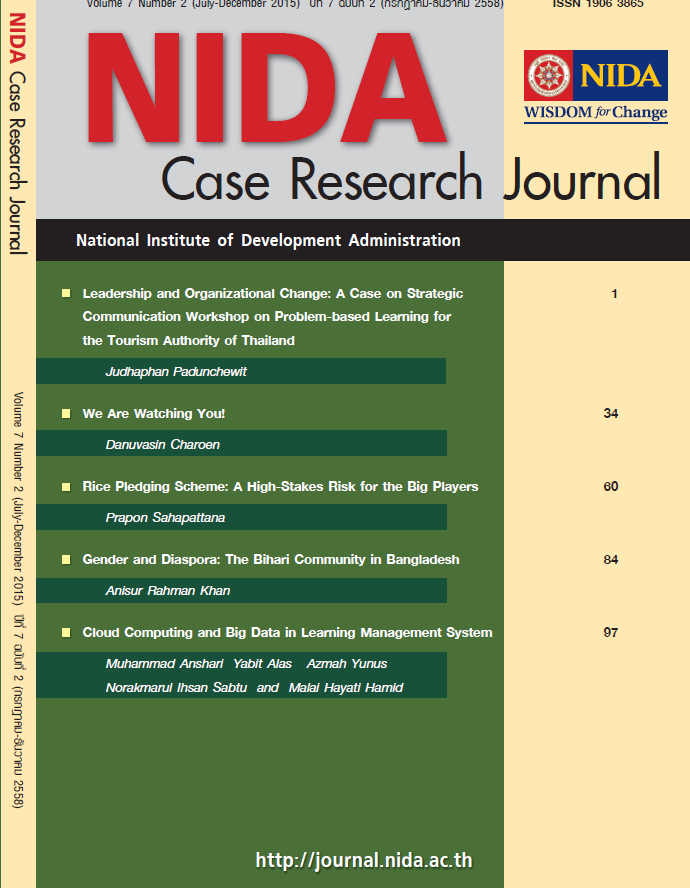We Are Watching You!
Keywords:
Internet Privacy, IT Ethics, Privacy issues on Internet, Thailand, Freedom of Expressions on InternetAbstract
While sitting in his office in downtown Bangkok on May 22nd, 2014, Mr. Thomas Drucker, the managing director of IBC (International Business Computing), was shocked about the news that the Royal Thai Army had launched a coup d’état against the caretaker government of Thailand following six months of political unrest. Coming from the US, reputedly the most democratic country in the world, he was displeased with this disturbing news. After the coup, the military created a junta called the National Council for Peace and Order (NCPO) to govern Thailand. He pondered what effect this coup would have on the company’s business in Thailand.
A week later, Drucker was outraged to learn from the news that the military was hunting down Internet users who had posted contents against the coup. The news also mentioned that the junta was setting up a surveillance center to monitor any citizens who provided comments against the junta’s policies. “What type of country are we in?,” he asked his wife. “Absolute power corrupts absolutely,” she calmly replied.
A couple days later, the IBC announced that it was looking for a promising candidate that would supervise the newest IT business solution division. Thomas had high expectations for anyone that would be in this position because the new division would be tasked with penetrating the new market for IBC’s business services in Thailand.
As Thomas paused, the phone rang. At the other end of the line was Dan Grestner, the CEO of IBC and Thomas’s direct boss. Dan told Thomas that he heard that the IBC (Thailand) had opened a director position for the newest IT business solution. During his lecture at MIT, he went on, he hads met a promising Thai student, Tanakorn Sakchai, who had just graduated with honours in his MBA degree, majoring in IT management. Takakorn also had had extensive experience in IT management. Dan hoped that Tanakorn could fill the opened directorial position. He mentioned: “He is one of the smartest people I have ever met.”. Thomas replied, “I’m looking forward to meeting him.”
Two days later, Tanakorn came to Thomas’s office. Tanakorn told Thomas that he had lived and worked in the US for ten years after graduating from Chulalongkorn University with a honour’s computer engineering degree. He had worked for several global IT companies, such as Microsoft, Google, and Amazon. He now wanted to be at home, he explained, so that he could be close to his family. Also, he really wanted the director position for IT business solutions because he could apply both his technical knowledge and business background to the job. Thomas was really impressed with Tanakorn’s qualifications. “Welcome aboard,” he said to Tanakorn. “I’m looking forward to working with you soon.” Tanakorn replied, “Thanks, Boss.”
Soon thereafter, IBC HR manager Somsri Benjawan, in undertaking her customary practice of investigating the social media profiles of job candidates, came upon a Los Angeles Times newspaper article that identified Tanakorn as a fervent supporter of former Prime Minister Yingluck. In addition, Tanakorn was identified in the article as a key participant with the anti-coup Facebook page, where he often posted harsh comments against the military. Searching the anti-coup page, Somsri saw that Tanakorn was one of its most avid supporters. Somsri knew that she had to reveal her findings to her boss, Thomas.
Walking into his office, Somsri began with, “I think we have a situation on our hands.” She then went on to explain what she had uncovered in her search of Tanakorn’s name on the Internet and social networks. “We found many records of him supporting the anti-coup on the Internet and social networks,” she continued. “This can get our business in Thailand in trouble.”
Thomas instantly, albeit reluctantly, surmised that he might have to reconsider Tanakorn’s candidacy. But, he knew that people with his credentials did not walk into the door of the company every day. “If we let him go, he might be swept up by our competition,” he fretted. “But, on the other hand, if someone Googles his name or checks his name on social networks, this might get us in trouble with the military, which at the moment governs the country.”
Upon his arrival home, Thomas remained confiicted about what to do. Tanakorn was the perfect candidate for the job, he had the support of the CEO, and the Company’s policy had always been to support democracy and freedom of expression. But, on the other hand, if the Company brought Tanakorn aboard and someone later found out about his history on the Internet, the Company could have serious problems with the military. And he knew that that IBC could not afford to have the military as its enemy. “What should I do?,” he finally asked aloud, his voice almost quavering with anguish.





